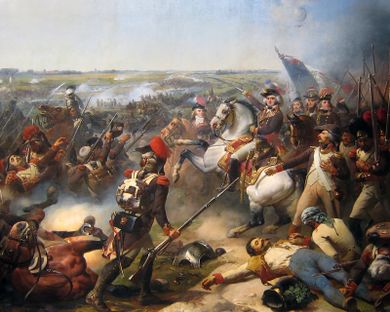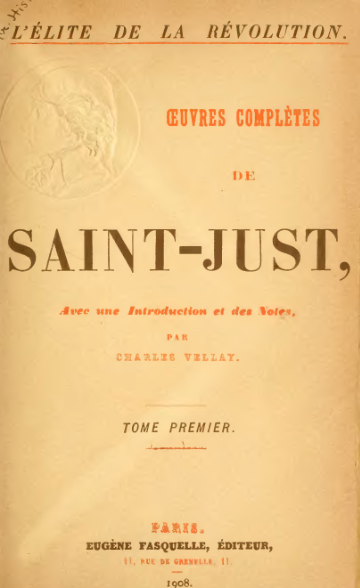لوي أنطوان دى سان-جوست
لوي أنطوان دى سان-جوست Louis Antoine de Saint-Just | |
|---|---|
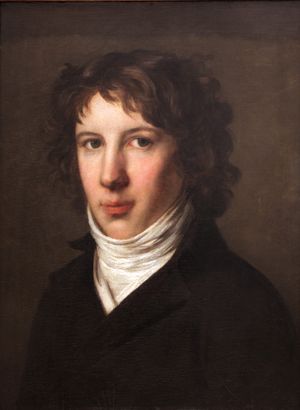 Saint-Just by Prud'hon, 1793 (متحف الفنون الجميلة (ليون)) | |
| Member of the National Convention | |
| في المنصب 20 September 1792 – 27 July 1794 | |
| 38th President of the National Convention | |
| في المنصب 19 February 1794 – 6 March 1794 | |
| Member of the Committee of Public Safety | |
| في المنصب 30 May 1793 – 27 July 1794 | |
| تفاصيل شخصية | |
| وُلِد | 25 أغسطس 1767 Decize, فرنسا |
| توفي | 28 يوليو 1794 (aged 26) Paris, France |
| الحزب | The Mountain |
لوي أنطوان دى سان-جوست Louis Antoine Léon de Saint-Just[أ] (النطق الفرنسي: [sɛ̃ʒyst]; 25 أغسطس 1767 – 28 يوليو 1794) was a military and political leader during the French Revolution. The youngest of the deputies elected to the National Convention in 1792, Saint-Just rose quickly in their ranks and became a major leader of the government of the French First Republic. He spearheaded the movement to execute King Louis XVI and later drafted the radical French Constitution of 1793.
He became a close friend of Maximilien Robespierre, and served with him as one of the commissioners of the Committee of Public Safety. Dispatched as a commissar to the army during its rocky start in the French Revolutionary Wars, Saint-Just imposed severe discipline, and he was credited by many for the army's subsequent revival at the front. Back in Paris, he supervised the consolidation of Robespierre's power through a ruthless and bloody program of intimidation. In his relatively brief time on the historical stage, he became the enduring public face of the Reign of Terror and was dubbed the "Angel of Death" by later writers. Saint-Just organized the arrests and prosecutions of many of the most famous figures of the Revolution.
Saint-Just was arrested in the violent episode of 9 Thermidor and executed the next day with Robespierre and their allies. In many histories of the Revolution, their deaths at the guillotine mark the end of the Reign of Terror.
. . . . . . . . . . . . . . . . . . . . . . . . . . . . . . . . . . . . . . . . . . . . . . . . . . . . . . . . . . . . . . . . . . . . . . . . . . . . . . . . . . . . . . . . . . . . . . . . . . . . . . . . . . . . . . . . . . . . . . . . . . . . . . . . . . . . . . . . . . . . . . . . . . . . . . . . . . . . . . . . . . . . . . . .
سيرته الثورية المبكرة
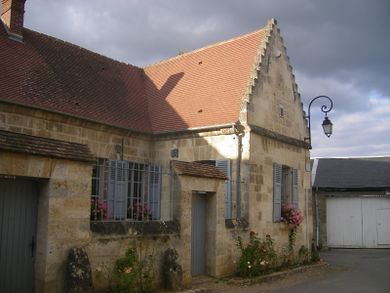
روح الثورة
While Saint-Just waited for the next election, he composed an extensive work, L'Esprit de la Revolution et de la constitution de France, published in the spring of 1791.[1] His writing style had shed all satire and now adopted the stern and moralizing tone of classical Romans so adored by French revolutionaries.[2] It revealed an unexpectedly moderate set of principles deeply influenced by Montesquieu, and remained fully confined to a paradigm of constitutional monarchy.[1]
نائب في المجلس
Among the deputies, Saint-Just was watchful but interacted little at first. He joined the Parisian Jacobin Club but he remained aloof from Girondins and Montagnards alike.[3]
دستور 1793
Because the first French Constitution had included a role for the king, it was long since invalid and needed to be updated for the Republic. A large number of drafts had been circulating within the Convention since the king's execution, and Saint-Just submitted his own lengthy proposal on 24 April 1793.[4]
لجنة السلامة العامة
Proscription of the Girondins
During the time that Saint-Just was working on the constitution, dramatic political warfare was taking place. The sans-culottes – deemed "the people" by many radicals, and represented by the Paris Commune – had grown antipathetic to the moderate Girondins and on 2 June 1793, in a mass action supported by National Guardsmen, they surrounded the Convention and exacted the arrest of the Girondin deputies.
المفوض العسكري
Saint-Just made the proposal that deputies from the Convention should directly oversee all military efforts, which was approved on 10 October 1793.[5]
| " Soldiers, we have come to avenge you, and to give you leaders who will marshal you to victory. We have resolved to seek out, to reward, and to promote the deserving; and to track down all the guilty, whoever they may be... All commanders, officers, and agents of the government are hereby ordered to satisfy within three days the just grievances of the soldiers. After that interval we will ourselves hear any complaints, and we will offer such examples of justice and severity as the Army has not yet witnessed."[6] |
| – Saint-Just's first proclamation to the Army of the Rhine, 1793 |
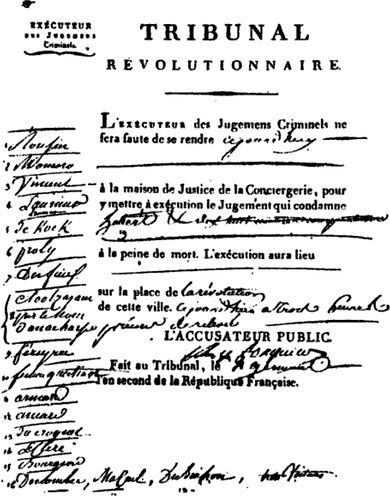
جرمينال
As the spring of 1794 approached, the Committee of Public Safety, led by Robespierre, Couthon, Lebas and Saint-Just, exercised near complete control over the government.[7]
Danton’s criticism of the Terror won him some support,[8] but a financial scandal involving the French East India Company provided a "convenient pretext" for his downfall.[9] Robespierre again sent Saint-Just to the Convention to deliver a Committee "report" (31 March 1794) in which he announced the arrest of Danton and "the last partisans of royalism".[9]
أيامه الأخيرة
معركة فلوروس
Thermidor
On the dais, Saint-Just declared the absolute necessity of current law, and conspiring deputies buzzed angrily as he spoke. Finally several of them physically shoved him away from the lectern, and each started his own address in which they called for the removal of Robespierre and all his supporters. Amid the uproar, recalled Barras, Saint-Just "did not leave the platform, in spite of the interruptions which would have driven any one else away. He only came down a few steps, then mounted again, to continue his discourse proudly... Motionless, unmoved, he seemed to defy everyone with his calm."[10]
ذكراه
. . . . . . . . . . . . . . . . . . . . . . . . . . . . . . . . . . . . . . . . . . . . . . . . . . . . . . . . . . . . . . . . . . . . . . . . . . . . . . . . . . . . . . . . . . . . . . . . . . . . . . . . . . . . . . . . . . . . . . . . . . . . . . . . . . . . . . . . . . . . . . . . . . . . . . . . . . . . . . . . . . . . . . . .
منشورات بعد وفاته
- Saint-Just, Fragments sur les institutions républicaines (بالفرنسية)
- Saint-Just, Théorie politique, edited by Alain Liénard, Seuil, Paris, 1976. (بالفرنسية)
المجموعات الكاملة
- Œuvres de Saint-Just, précédés d'une notice historique sur sa vie edited by Adolphe Havard, Paris, 1834. (بالفرنسية)
- Œuvres complètes de Saint-Just in two volumes edited by Charles Vellay, Paris, 1908. (بالفرنسية)
- Œuvres choisies, with introduction by Jean Gratien, Paris, 1946. (بالفرنسية)
- Œuvres complètes, edited by Michèle Duval, Paris, 1984. (بالفرنسية)
- Œuvres complètes, edited by Anne Kupiec and Miguel Abensour, Paris, 2004. (بالفرنسية)
شخصيته
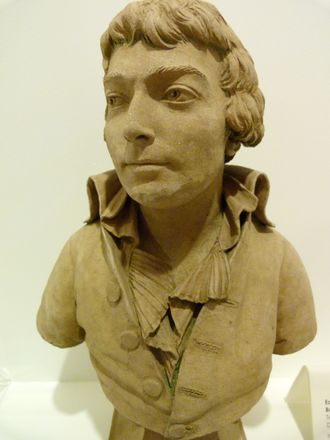
ملاحظات
- ^ Traditional usage is by the nom de terre ("name of land") without using the nobiliary particle.
الهامش
- ^ أ ب Hampson, pp. 30–31.
- ^ Hampson, p. 37.
- ^ Hampson, pp. 78–79.
- ^ Hampson, pp. 100–101.
- ^
 Chisholm, Hugh, ed. (1911). . دائرة المعارف البريطانية. Vol. 24 (eleventh ed.). Cambridge University Press. pp. 20–21.
Chisholm, Hugh, ed. (1911). . دائرة المعارف البريطانية. Vol. 24 (eleventh ed.). Cambridge University Press. pp. 20–21. {{cite encyclopedia}}: Cite has empty unknown parameter:|coauthors=(help) - ^ Bruun, p. 75.
- ^ Bax, p. 84.
- ^ خطأ استشهاد: وسم
<ref>غير صحيح؛ لا نص تم توفيره للمراجع المسماةHazani113 - ^ أ ب خطأ استشهاد: وسم
<ref>غير صحيح؛ لا نص تم توفيره للمراجع المسماةDoyle272ff - ^ Béraud, pp. 111–112.
ببليوگرافيا
- Abensour, Miguel (1990). "Saint-Just and the Problem of Heroism in the French Revolution." In The French Revolution and the Birth of Modernity edited by Feher Ferenc. Berkeley: University of California Press. ISBN 978-0-520-07120-9.
- Andress, David (2006). The Terror: The Merciless War for Freedom in Revolutionary France. New York: Farrar, Straus and Giroux. ISBN 0-374-53073-4.
- Aulard, François (1910). The French Revolution: A Political History, 1789–1804. Vol. II. New York: Charles Scribner's Sons. OCLC 25917606.
- Baker, Keith Michael (1987). The Old regime and the French Revolution. Chicago: University of Chicago Press. ISBN 978-0-226-06950-0.
- Bax, Ernest Belfort (1890). The Story of the French Revolution. London: Swan Sonnenschein. OCLC 6024337.
- Béraud, Henri (1968) [1928]. Twelve portraits of the French Revolution. Freeport, NY: Books for Libraries Press. OCLC 427303.
- Büchner, Georg; Price, Victor (1971). The Plays of Georg Büchner. Oxford University Press. ISBN 978-0-19-281120-2.
- Bruun, Geoffrey (1966). Saint-Just: Apostle of the Terror. Hamden, CT: Archon Books. OCLC 1142850.
- Camus, Albert (1991) [1951]. The Rebel: an essay on man in revolt. New York: Vintage International. ISBN 0-679-73384-1.
- Carlyle, Thomas (1860) [1837]. The French Revolution: A History. Vol. II. New York: Harper & Bros. OCLC 14208955.
 Chisholm, Hugh, ed. (1911). . دائرة المعارف البريطانية. Vol. 24 (eleventh ed.). Cambridge University Press. pp. 20–21.
Chisholm, Hugh, ed. (1911). . دائرة المعارف البريطانية. Vol. 24 (eleventh ed.). Cambridge University Press. pp. 20–21. {{cite encyclopedia}}: Cite has empty unknown parameter:|coauthors=(help)- Curtis, Eugene Newton (1973). Saint-Just, colleague of Robespierre. New York: Octagon Books. ISBN 0-374-92010-9.
- Doyle, William (1990). The Oxford History of the French Revolution (2 ed.). Oxford; New York: Oxford University Press. ISBN 978-0-19-925298-5.
- Hampson, Norman (1991). Saint-Just. Oxford: Basil Blackwell, Ltd. ISBN 0-631-16233-X.
- Hazani, Moshe (1989). "The Duel That Never Was". International Society of Political Psychology. 10 (1). doi:10.2307/3791590. JSTOR 3791590. OCLC 482537177.
- Higonnet, Patrice (1998). Goodness Beyond Virtue: Jacobins During the French Revolution. Cambridge: Harvard University Press. ISBN 0-674-47061-3.
- Jordan, David P. (1979). The King's Trial: Louis XVI vs. the French Revolution. Berkeley: University of California Press. ISBN 0-520-03684-0.
- Knee, Philip (2006). "An Ethics of Measure: Camus and Rousseau". In Daigle, Christine (ed.). Existentialist Thinkers and Ethics. Montreal: McGill-Queen's University Press. ISBN 978-0-7735-3138-3.
- Loomis, Stanley (1986). Paris in the Terror. Richardson & Steirman. ISBN 978-0-931933-18-9.
- Mason, L.; Rizzo, T., eds. (1999). The French Revolution: A Document Collection. Boston: Houghton Mifflin. ISBN 0-669-41780-7.
- Monar, Jörg (1993). Saint-Just: Sohn, Denker und Protagonist der Revolution (in German). Bonn: Bouvier. ISBN 3-416-02466-4.
{{cite book}}: CS1 maint: unrecognized language (link) - Palmer, R.R. (1969) [1941]. Twelve Who Ruled. Princeton, NJ: Princeton University Press. ISBN 0-691-05119-4.
- Rudé, George (1988). The French Revolution. New York: Grove Weidenfeld. ISBN 0-8021-3272-3.
- Schama, Simon (1989). Citizens: A Chronicle of the French Revolution. New York: Vintage. ISBN 0-679-72610-1.
- Scurr, Ruth (1989). Fatal Purity: Robespierre and the French Revolution. Vintage. ISBN 978-0-09-945898-2.
- Soboul, Albert (1975). The French Revolution 1787–1799. New York: Vintage. ISBN 0-394-71220-X.
- Soboul, Albert (1980). The Sans-culottes. Princeton, NJ: Princeton University Press. ISBN 0-691-00782-9.
- Stephens, Henry Morse (1892). The Principal Speeches of the Statesmen and Orators of the French Revolution, 1789–1795. Oxford: Clarendon Press. OCLC 759870.
- Ten Brink, Jan (1899). Robespierre and the Red Terror. London: Hutchinson & Co. OCLC 2988851.
- Thompson, James Matthew (1968) [1935]. Robespierre. Vol. 1. New York: Howard Fertig. OCLC 401482.
- Walzer, Michael, ed. (1974). Regicide and Revolution: Speeches at the Trial of Louis XVI. London: Cambridge University Press. ISBN 0-521-20370-8.
- Vinot, Bernard (2002) [1985]. Saint-Just (in French). Paris: Grand livre du mois. ISBN 2-7028-8040-1.
{{cite book}}: CS1 maint: unrecognized language (link) - Vinot, Bernard (1985). Saint-Just (in French). Paris: Fayard. ISBN 978-2-213-01386-2.
{{cite book}}: CS1 maint: unrecognized language (link)
. . . . . . . . . . . . . . . . . . . . . . . . . . . . . . . . . . . . . . . . . . . . . . . . . . . . . . . . . . . . . . . . . . . . . . . . . . . . . . . . . . . . . . . . . . . . . . . . . . . . . . . . . . . . . . . . . . . . . . . . . . . . . . . . . . . . . . . . . . . . . . . . . . . . . . . . . . . . . . . . . . . . . . . .
للاستزادة
- François Aulard: Les Orateurs de la Législative et de la Convention (1883) (بالفرنسية)
- Édouard Fleury: Saint-Just et la terreur (1852) (بالفرنسية)
- Ernest Hamel: Histoire de Saint-Just (1859) (بالفرنسية)
- Marisa Linton, "Saint-Just: the French Revolution’s ‘Angel of Death’", History Today, 65, issue 1, January 2015
- Marisa Linton: "The Man of Virtue: The Role of Antiquity in the Political Trajectory of L. A. Saint-Just", French History 24, 3 (2010): pp. 393–419
- Albert Soboul: "Robespierre and the Popular Movement of 1793–4", Past and Present (May 1954) (الإنگليزية)
وصلات خارجية
- مقالات المعرفة المحتوية على معلومات من دائرة المعارف البريطانية طبعة 1911
- Pages using infobox officeholder with unknown parameters
- Articles with hatnote templates targeting a nonexistent page
- Articles with بالفرنسية-language external links
- Articles containing فرنسية-language text
- مواليد 1767
- وفيات 1794
- أشخاص من نييڤر
- نبلاء فرنسيون
- Jacobins
- Montagnards
- أشخاص في لجنة السلامة العامة
- نواب في المؤتمر الوطني الفرنسي
- Représentants en mission
- قتلة الملك لويس السادس عشر
- أشخاص في عهد الرعب
- سياسيون من برگندي
- كتاب سياسيون فرنسيون
- فرنسيون أُعدِموا بالمقصلة أثناء الثورة الفرنسية
- رؤساء المؤتمر الوطني
- People imprisoned by lettre de cachet

